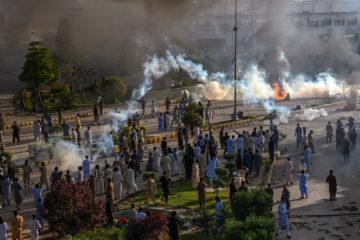Farzana Shaikh in Time:
 Few will have missed the bitter irony of a court ruling against Pakistan’s former Prime Minister, Imran Khan, who was found guilty of corruption, sentenced to three years in prison, and barred from contesting elections for five years. For however his legacy is judged in years to come, Khan will be remembered above all for his single-minded crusade to root out “corruption” from the political fabric of Pakistan. The ruling against Khan was not unexpected. Since his removal from office following a no-confidence motion in April 2022, as well as his increasingly confrontational posture with the military (which he blamed for his downfall), many believed it was only a matter of time before Khan lost his freedom completely.
Few will have missed the bitter irony of a court ruling against Pakistan’s former Prime Minister, Imran Khan, who was found guilty of corruption, sentenced to three years in prison, and barred from contesting elections for five years. For however his legacy is judged in years to come, Khan will be remembered above all for his single-minded crusade to root out “corruption” from the political fabric of Pakistan. The ruling against Khan was not unexpected. Since his removal from office following a no-confidence motion in April 2022, as well as his increasingly confrontational posture with the military (which he blamed for his downfall), many believed it was only a matter of time before Khan lost his freedom completely.
With Pakistan’s ruling coalition imminently poised to step down and make way for a caretaker government, Khan’s incarceration was seen as the last bit of unfinished business ahead of general elections. These should be held within 90 days but could come as late as Spring 2024, following a decision on August 5, 2023 by the Council of Common Interests (responsible for overseeing relations between Pakistan’s federating units) to approve the demarcation of new constituencies based on the latest census data—a skillful maneuvering tactic by Pakistan’s all-powerful military, which is desperate to use the time to dampen Khan’s soaring popularity.
More here.
